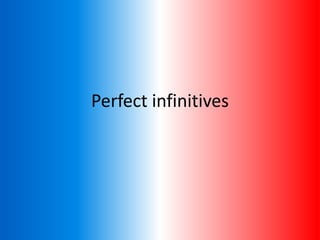Signaler
Partager

Recommandé
Recommandé
Contenu connexe
Plus de kerrie1996
Plus de kerrie1996 (20)
Perfect infinitives
- 2. • The perfect infinitive is used after APRÈS to say “after doing”/ “having done something”. • It is made up of the auxiliary in the infinitive form and a past participle (with MRS VANDERTRAMP and reflexive verbs taking être) . Après avoir regardé la télé, il s’est couché. Après être rentrés, mes parents ont bu un tasse de thé.